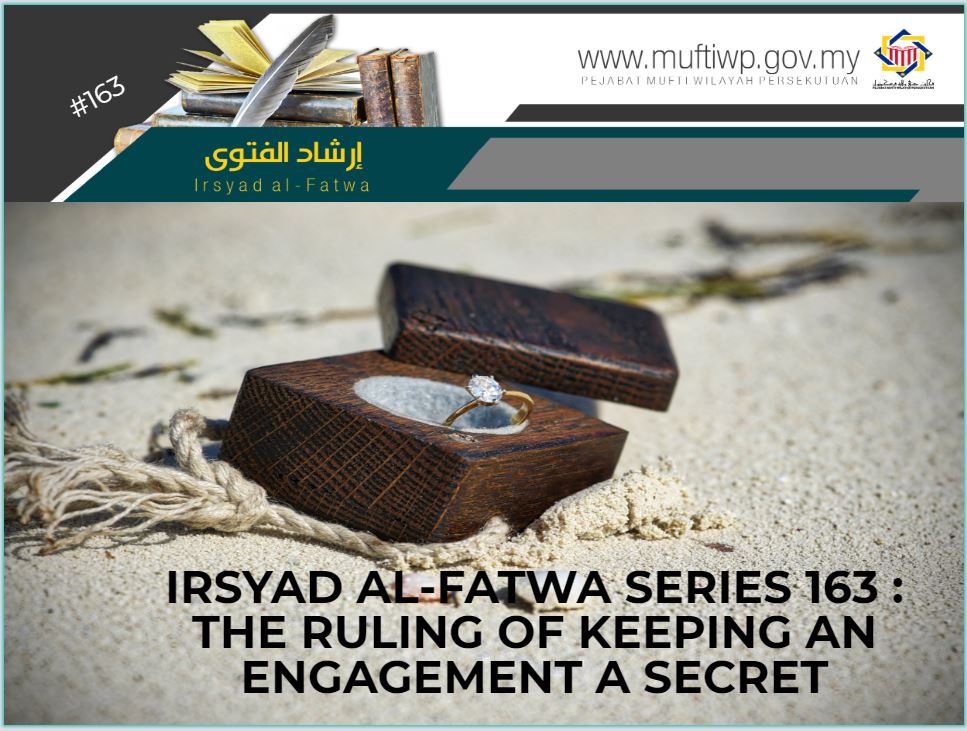Question:
What is the ruling for someone that hides his engagement and keep it as a secret from the public?
Answer:
Alhamdulillah, praise and thanks to Allah for the many countless blessings He has blessed us all with. Blessings and salutations to the Prophet Muhammad PBUH, his wives, his family, companions and all those that follow his teachings to the day of judgement.
An engagement is a promise made by two people; a future husband and wife to marry each other and it is usually held during a certain agreed time by the family of the man and woman.
The usual issue for an engagement is whether or not it is permitted by syarak to announce an engagement as we usually announce a marriage.
Some scholars hold the opinion that it is encouraged to keep an engagement a secret. The reason is, there is a hadith from Ummu Salamah R.Anha, where the Prophet PBUH said:
أظهروا النكاح، وأخفوا الخطبة
“Announce a marriage and hide an engagement.”
Narrated by al-Imam al-Dailami in Musnad al-Firdaus (1/1/27)
Thus, some scholars of mazhab Maliki encouraged hiding an engagement. This is in accordance with a statement by al-Kharasyi Rahimahullah (w.1101H) in Syarh Mukhtasar al-Khalil:
وَأَمَّا الْخِطْبَةُ بِالْكَسْرِ فَيُنْدَبُ إخْفَاؤُهَا كَالْخِتَانِ وَإِنَّمَا نُدِبَ الْإِخْفَاءُ خَوْفًا مِنْ الْحَسَدَةِ فَيَسْعَوْنَ بِالْإِفْسَادِ بَيْنَهُ وَبَيْنَ أَهْلِ الْمَخْطُوبَةِ
“As for al-Khitbah (an engagement), then it is encouraged to keep it a secret just like al-Khitan. It is encouraged to hide it in fear that it could lead to jealousy that could harm both people who are getting engaged.” [1]
However, other scholars state that announcing an engagement is not an issue for there is no sound evidence that prohibits it. The hadith from Ummu Salamah R.Anha is classified as a dhaif (weak) hadith for one of its narrators is majhul (unknown). Furthermore, al-Hafiz Ibn Hajar al-‘Asqalani Rahimahullah did not comment on the above hadith in his Mukhtasar (Summary) of Musnad al-Firdaus.
Al-Syeikh ‘Atiyyah al-Saqr Rahimahullah (w.1427H), former Head of Lajnah al-Ifta’ al-Azhar, was asked regarding the issue in a discussion and he said that it is permissible to announce an engagement for there is no sound evidence that states its restriction. He further adds, even if there is sound evidence, the restriction is for the excessive announcement of the engagement. [2]
Conclusion
We are inclined towards the opinion that permits the announcement of an engagement. This is to ensure that no one else would offer a proposal to the engaged woman for it is prohibited in Islam. By announcing the engagement, it would prevent the situation from happening. In a hadith from Ibn ‘Umar R.Anhuma, the Prophet PBUH said:
لاَ يَبِعِ الرَّجُلُ عَلَى بَيْعِ أَخِيهِ وَلاَ يَخْطُبْ عَلَى خِطْبَةِ أَخِيهِ إِلاَّ أَنْ يَأْذَنَ لَهُ
“A person should not enter into a transaction when his brother is already making a transaction and he should not make a proposal of marriage when his brother has already made a proposal except when he gives permission.”
Sahih Muslim (1412)
Al-Imam al-Nawawi Rahimahullah (w.676H) comments on the above hadith saying that the hadith clearly states the prohibition of someone to propose to a woman who has already accepted a proposal from someone else, without the permission of the person that proposed first. A marriage resulted from the second proposal is valid, however, the act of proposing upon someone else’s proposal is sinful and prohibited. [3]
There is no issue for someone to announce his engagement. However, it should not be done excessively, and the event should not be as grand as a marriage, for an engagement is just a promise for marriage and it can be cancelled.
Hence, it is encouraged to be moderate in an engagement and it is also permissible for someone to keep his engagement a secret to avoid jealousy and others, as long as it does not lead to fitnah. Wallahua’lam.
End Notes:
[1] See Syarh Mukhtasar al-Khalil. Dar al-Fikr, (3/167)
[2] https://www.youtube.com/watch?v=dzSL5_Bl_ZE
[3] See Al-Minhaj Syarh Sahih Muslim. Dar Ihya’ al-Turath al-‘Arabi, (9/197)


